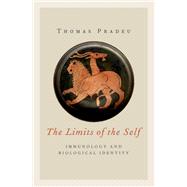
Note: Supplemental materials are not guaranteed with Rental or Used book purchases.
Purchase Benefits
What is included with this book?
| Acknowledgments | p. vii |
| List of Figures | p. ix |
| Introduction | p. 1 |
| Immunology, Self and Nonself | p. 15 |
| The Self-Nonself Theory | p. 49 |
| Critique of the Self-Nonself Theory | p. 85 |
| The Continuity Theory | p. 131 |
| Comparing the Continuity Theory to Other Immunological Theories | p. 185 |
| What Is an Organism? Immunity and the Individuality of the Organism | p. 219 |
| Conclusion | p. 267 |
| Notes | p. 271 |
| References | p. 275 |
| Index | p. 299 |
| Table of Contents provided by Ingram. All Rights Reserved. |
The New copy of this book will include any supplemental materials advertised. Please check the title of the book to determine if it should include any access cards, study guides, lab manuals, CDs, etc.
The Used, Rental and eBook copies of this book are not guaranteed to include any supplemental materials. Typically, only the book itself is included. This is true even if the title states it includes any access cards, study guides, lab manuals, CDs, etc.